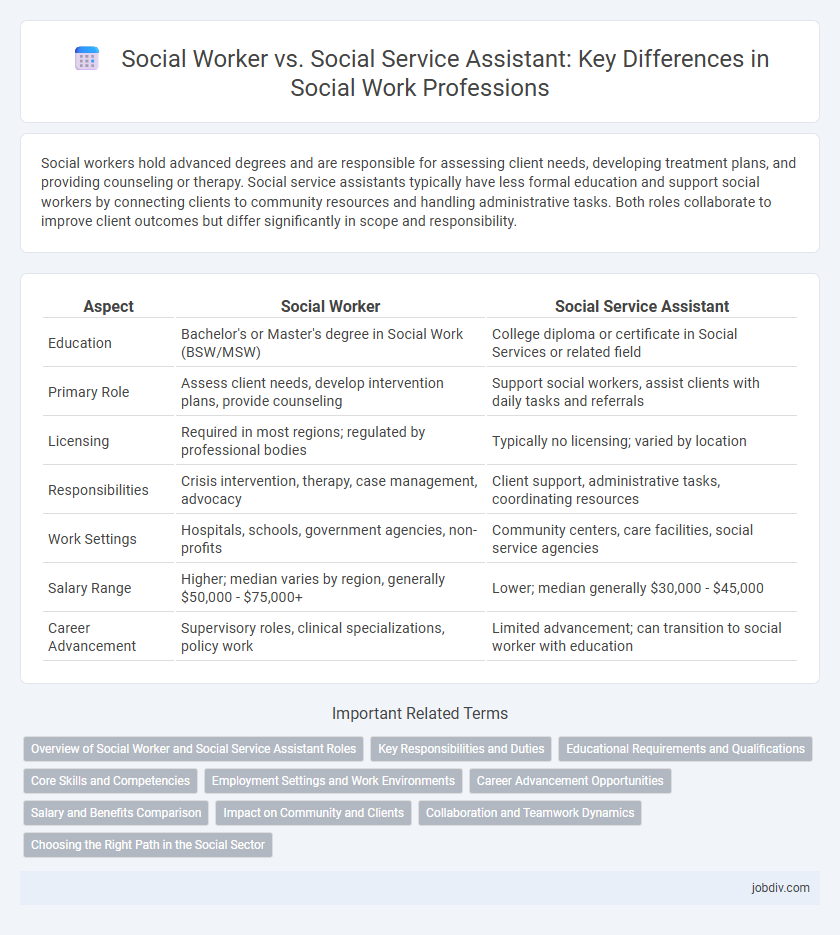Social workers hold advanced degrees and are responsible for assessing client needs, developing treatment plans, and providing counseling or therapy. Social service assistants typically have less formal education and support social workers by connecting clients to community resources and handling administrative tasks. Both roles collaborate to improve client outcomes but differ significantly in scope and responsibility.
Table of Comparison
| Aspect | Social Worker | Social Service Assistant |
|---|---|---|
| Education | Bachelor's or Master's degree in Social Work (BSW/MSW) | College diploma or certificate in Social Services or related field |
| Primary Role | Assess client needs, develop intervention plans, provide counseling | Support social workers, assist clients with daily tasks and referrals |
| Licensing | Required in most regions; regulated by professional bodies | Typically no licensing; varied by location |
| Responsibilities | Crisis intervention, therapy, case management, advocacy | Client support, administrative tasks, coordinating resources |
| Work Settings | Hospitals, schools, government agencies, non-profits | Community centers, care facilities, social service agencies |
| Salary Range | Higher; median varies by region, generally $50,000 - $75,000+ | Lower; median generally $30,000 - $45,000 |
| Career Advancement | Supervisory roles, clinical specializations, policy work | Limited advancement; can transition to social worker with education |
Overview of Social Worker and Social Service Assistant Roles
Social workers provide comprehensive support, including assessment, counseling, and intervention, to help individuals cope with various social and personal challenges. Social service assistants perform supportive tasks such as case management, client intake, and resource coordination to aid social workers and improve client outcomes. Both roles are essential in delivering social services but differ in scope and responsibility levels.
Key Responsibilities and Duties
Social workers assess client needs, develop intervention plans, and provide counseling to support mental health, family dynamics, and crisis situations. Social service assistants focus on administrative tasks such as maintaining records, coordinating services, and assisting clients with accessing resources and basic needs. Both roles collaborate to improve client well-being, but social workers carry more direct responsibility for case management and therapeutic support.
Educational Requirements and Qualifications
Social workers typically require a bachelor's degree in social work (BSW) or a related field, with many positions demanding a master's degree in social work (MSW) for clinical or specialized roles. Social service assistants generally need a high school diploma or equivalent, though some employers prefer candidates with postsecondary training or an associate degree in human services or social sciences. Licensure or certification is often mandatory for social workers but usually not required for social service assistants, reflecting differences in educational depth and professional responsibilities.
Core Skills and Competencies
Social Workers possess advanced competencies in client assessment, crisis intervention, and individualized care planning, enabling them to address complex psychosocial issues and advocate for systemic change. Social Service Assistants specialize in support skills such as case management, community resource coordination, and basic client counseling, focusing on implementing care plans and facilitating access to services. Both roles require strong communication, empathy, and organizational abilities, yet Social Workers typically hold higher educational qualifications, enhancing their capacity for direct therapeutic intervention and policy advocacy.
Employment Settings and Work Environments
Social workers typically operate in diverse settings including hospitals, schools, and private practices, addressing complex client needs through counseling and case management. Social service assistants commonly work in community organizations, government agencies, and residential care facilities, providing support through administrative tasks and direct client assistance. Employment for social workers often requires advanced degrees and licensure, while social service assistants generally need a high school diploma or associate degree.
Career Advancement Opportunities
Social workers typically have greater career advancement opportunities compared to social service assistants due to their higher level of education, such as a bachelor's or master's degree in social work, and professional licensure requirements. They can advance to roles like clinical supervisors, program directors, or specialized counselors, whereas social service assistants often remain in entry-level support positions with limited promotional pathways. Professional development and continued education significantly enhance career progression potential for both roles but are more critical for social workers seeking leadership positions.
Salary and Benefits Comparison
Social workers typically earn a median annual salary of $50,000 to $60,000, while social service assistants earn approximately $30,000 to $40,000 per year, reflecting differences in education and responsibilities. Social workers often qualify for comprehensive benefits including health insurance, retirement plans, and professional development opportunities, whereas social service assistants may receive more limited benefit packages. Salary growth potential and job advancement are generally higher for social workers due to their advanced qualifications and licensure requirements.
Impact on Community and Clients
Social Workers provide comprehensive support through counseling, case management, and advocacy, directly improving clients' mental health and social well-being. Social Service Assistants enhance community impact by facilitating access to resources, conducting outreach, and offering administrative support, ensuring efficient service delivery. Together, these roles foster stronger community networks and promote sustained client empowerment.
Collaboration and Teamwork Dynamics
Social Workers lead complex case management efforts, collaborating closely with Social Service Assistants who provide essential support through client engagement and administrative tasks. Effective teamwork dynamics hinge on clear communication, mutual respect, and role clarity, ensuring cohesive service delivery that addresses clients' multifaceted needs. Research highlights that integrated collaboration between these roles enhances client outcomes and streamlines workflow efficiency in social service agencies.
Choosing the Right Path in the Social Sector
Choosing the right path in the social sector depends on the level of responsibility and required qualifications, with social workers typically holding a bachelor's or master's degree and managing complex cases involving counseling and advocacy. Social service assistants provide essential support by helping clients access resources and complete daily tasks under the supervision of social workers or other professionals. Understanding these distinctions ensures that individuals align their career goals with the appropriate education and job roles to effectively contribute to social welfare.
Social Worker vs Social Service Assistant Infographic

 jobdiv.com
jobdiv.com